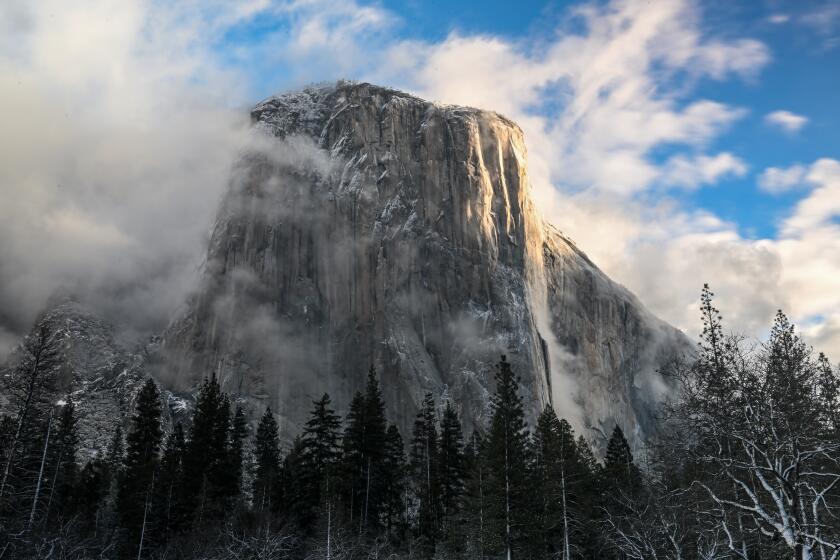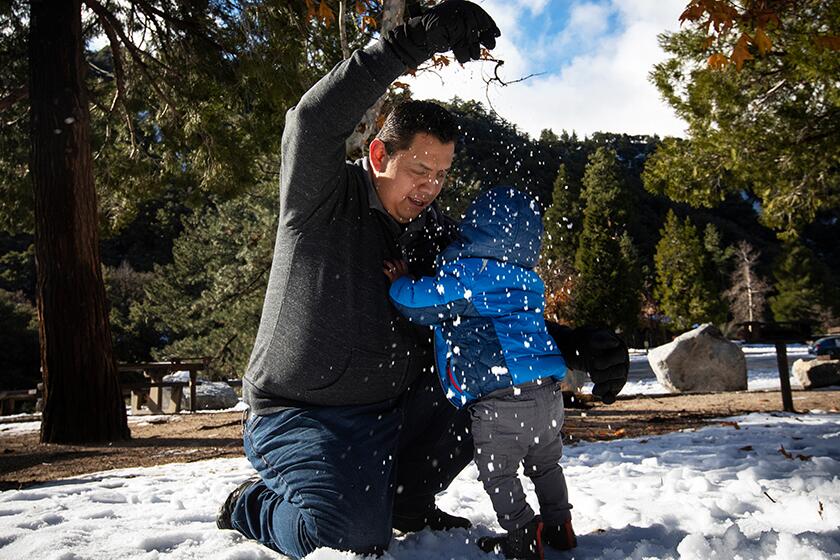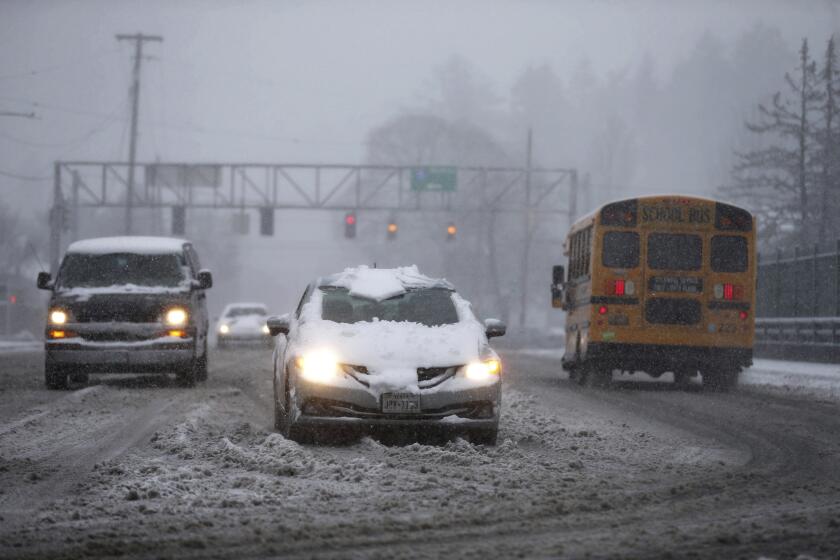Historic California storm closes Interstate 5 at the Grapevine
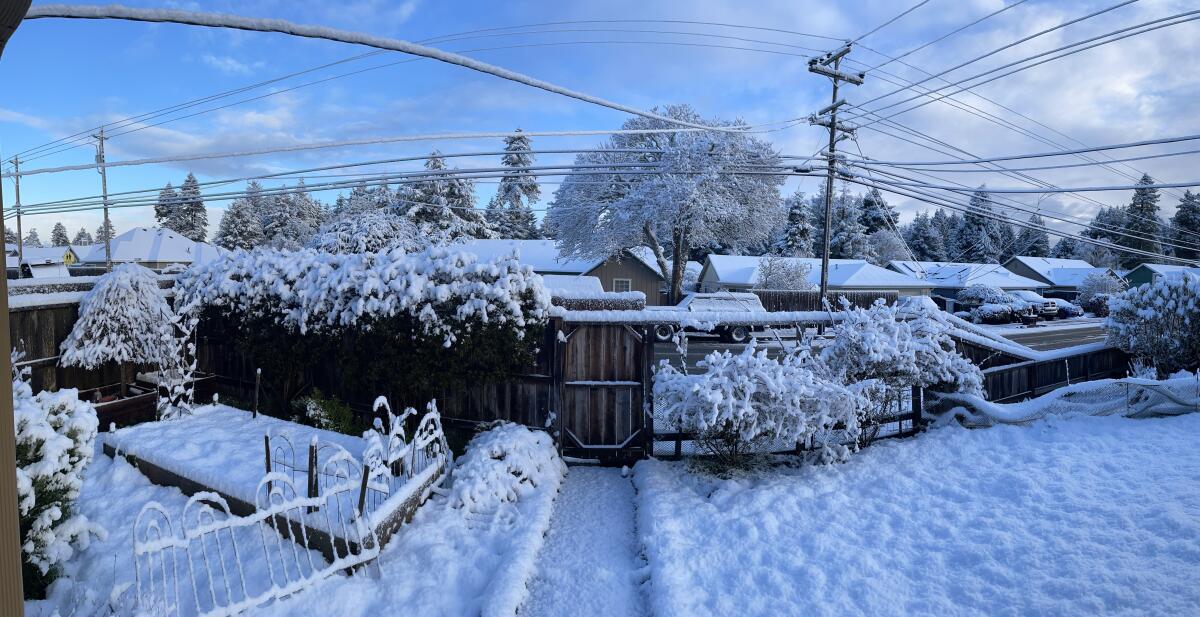
- Share via
A frigid winter storm barreled into California on Friday, bringing sea-level snow along the coast at Eureka and whiteout conditions in the Sierra as well as bursts of hail, snow and rain in Southern California that are expected to worsen considerably over the next two days.
Citing dangerous conditions, Caltrans closed Interstate 5 through the Grapevine early Friday. It is unclear how long the closure will last.
Cold temperatures brought snow, hail and graupel to unusually low elevations of the Southland, including at the Hollywood sign, slicking mountain roadways and spurring some school districts to cancel classes ahead of possible blizzard conditions.
Though the storm may be novel for Northern California, it has the potential to be historic in the southern part of the state, especially Friday and Saturday, UCLA climate scientist Daniel Swain said.
The “highly dynamic” system is likely to bring heavy rain, strong winds, thunderstorms and potential flooding to areas in and around Los Angeles, while snow levels could drop as low as 1,500 feet in the mountains of L.A. and Ventura counties. That’s the elevation of the Hollywood sign, where residents reported a wintry mix had landed Thursday afternoon.
“What is really kind of astonishing are the snow totals that are projected for the Southern California mountains and the southern Sierra Nevada,” Swain said.
Snowfall in some mountain areas could reach 3 or 4 feet over two days, with as much as 8 feet possible on certain mountain peaks.
The National Weather Service has issued rare blizzard warnings for the L.A., Ventura and San Bernardino county mountains beginning early Friday, warning of heavy snow, high winds and limited visibility. It’s only the second such warning on record for the mountains of L.A. and Ventura counties, and the first for San Bernardino County’s peaks. An evacuation warning was issued in portions of Ventura County until 10 a.m. Saturday, with officials warning of the potential for flooding and debris flows due to heavy rain and snow.
“This well may be the largest single-event snowfall in some parts of Southern California since the 1980s,” Swain said. “This is a big deal.”
The system is being driven by an area of low pressure off the coast of California that is slowly moving south from Canada.
In the state’s northwesternmost corner, Del Norte County schools closed Thursday because of the unusual winter weather.
“This is the first snow day we have had in the 31 years I have been with the district,” said Assistant Supt. Jeff Napier.
To Del Norte’s south, overnight snow blanketed much of Humboldt County on Thursday morning, from sea level to mountaintops. Roughly 3 inches had fallen on the roads, parks and farms of Eureka, Ferndale and other low-lying communities, while a growing 2 to 3 feet covered the mountains.
All of Humboldt County’s snowplows were out shoveling, said Public Works Director Thomas Matson. “I’d say once every 10 years we get some snow at sea level,” he said. “Though this is the thickest I’ve seen it.”
Caroline Titus, the owner, publisher, editor and reporter at the Ferndale Enterprise in Humboldt County, said the snow had turned her coastal town into a winter scene.
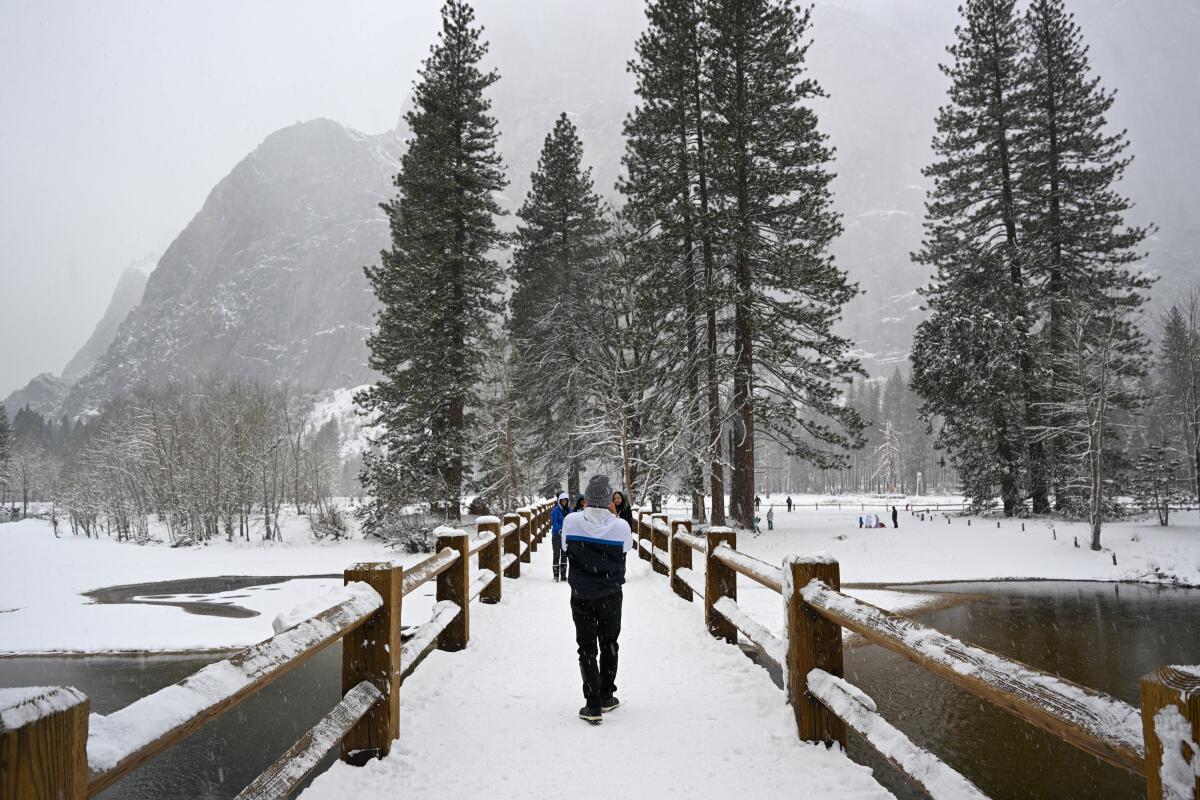
“There’s lots of people building snowmen,” she said. “Everybody’s out and about and checking it out, taking photos. It’s very rare.”
Titus said she’d seen this kind of snow only once before, about 22 years ago.
“Maybe there was a light dusting in 2019,” she said. “But nothing like this.”
In the North Coast’s higher elevations, snow quickly became a challenge on many mountain passes, closing a large section of U.S. 101 from Humboldt to Del Norte County early Thursday, then a different section in Mendocino County later in the day, according to the California Department of Transportation.
Lake, Mendocino, Napa and Sonoma counties had fresh snowfall at notably low elevations, around 500 to 1,000 feet, Swain said, with reports of some flurries in the hills of the East Bay Area.
Winter storms are expected to bring snow to some Southern California areas. If it snows at your home, send us a photo and we may include it in our coverage.
“There could be a couple of surprises tonight in the Bay Area or the Central Valley,” Swain said. “There might be a few places even below 500 feet that see certainly flakes in the air and maybe even a little bit of accumulation.”
But across the higher elevations, even just at or above 1,500 feet, Swain said snowfall could become heavy late Thursday, posing a risk for major roadways from the Sacramento Valley to the Santa Cruz Mountains and beyond.
In parts of Southern California, snow levels dropped to 1,500 feet Thursday, dusting the mountains and interior foothills, while higher elevations braced for hefty snow Friday through late Saturday.
Light snow was falling in Palmdale on Thursday morning, and roads were icy in the Inland Empire.
The wintry conditions were making a mess of traffic in the state, including a reported 20-car pileup in Yucaipa that sent eight people to the hospital and a crash along Highway 189 in Crestline that left more than a dozen drivers stranded in the snow. Caltrans maps showed dozens of major road closures Thursday evening, including both directions of the I-80 corridor near the Nevada border.
Whiteout conditions and spin-outs in the Truckee area shut down the interstate, said Chris Falkowski, a California Highway Patrol officer in the area. He couldn’t say when the highway would reopen.
“Whenever Mother Nature says we’re done,” Falkowski said. “If you don’t have to be up here, don’t bother. You’re just going to add to the problem.”
Forecasters also predicted gusty winds of up to 35 mph could generate 2- to 4-foot waves in the waters of Lake Tahoe into Friday. “That’s a significant amount of wind for a lake and producing those wave heights,” said Colin McKellar, a meteorologist at the National Weather Service in Reno.
About 12 to 18 inches of snow are expected to fall in South Lake Tahoe between Thursday and Saturday, he said. Snowfall is expected to pick up again Sunday afternoon until Tuesday night or Wednesday morning. “Right now, preliminary amounts are between 2 and 3 feet at lake level.”
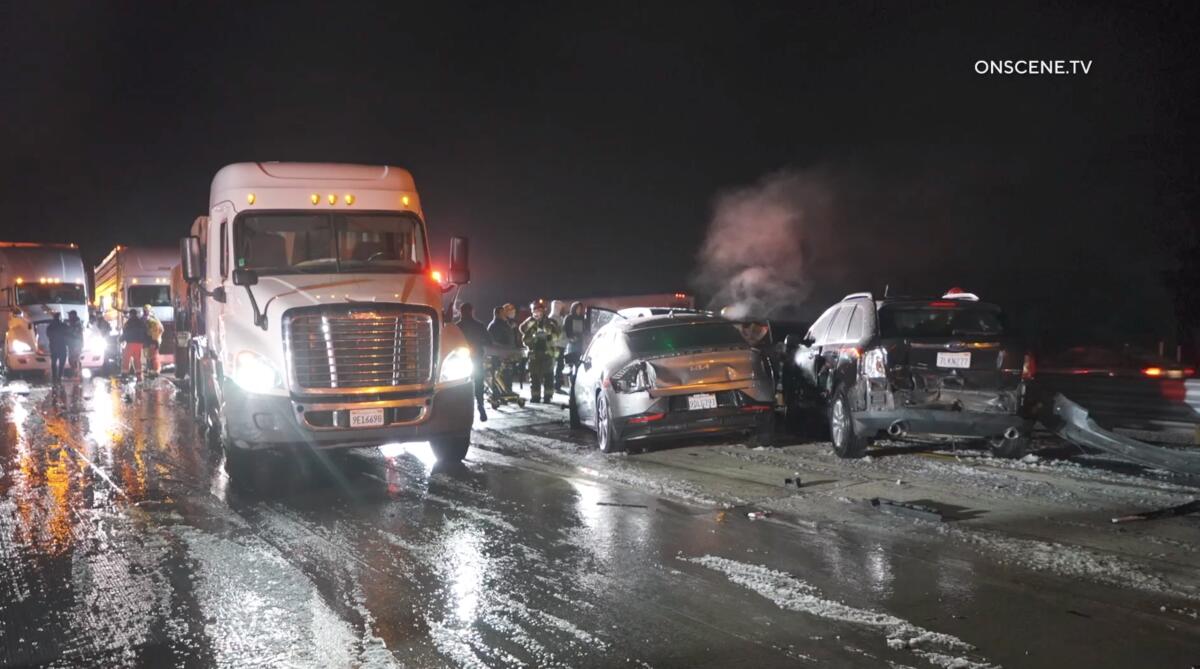
Six Flags Magic Mountain in Valencia closed Thursday due to the weather, as did Mt. Baldy Resort.
Heather West, a waitress at the Mt. Baldy Lodge, which sits at a significantly lower elevation than the resort, said she expected to work through the storm if possible.
“I’ll be up here as long as [the California Highway Patrol] doesn’t close down the road,” she said. Her manager had discussed plans to bus staff to the lodge so they wouldn’t have to drive on treacherous roads.
Mt. Baldy ski lifts generally shut down only for high winds, West said. But having grown up frequenting the resort, she acknowledged, “you never know with this road.”
Snowfall totals of 2 to 5 feet are forecast for the mountains above 5,000 feet, and 6 to 18 inches at elevations of 3,500 to 4,500 feet, according to the weather service. Officials are warning about downed trees, power outages and dangerous mountain roads in the days ahead, as well as the potential for avalanches.
Winter storms hit the U.S. from California to the northern Plains, while parts of the mid-Atlantic and Southeast see record-high temperatures.
Despite the temptation to take advantage of the fresh powder in the mountains, Swain and other officials warned that it was best to stay home.
“This is not a weekend you’re going to be able to go up and ski — no one is going to be able to get in or out, potentially for days,” he said. “And so if you live up there, be prepared for a phenomenal amount of snow.”
The storm is also expected to deliver rainfall totals of 2 to 5 inches in Southern California’s coasts and valleys and up to 10 inches in the mountains through Saturday evening.
With the heavy rain, officials are warning of the threat of mudflows in wildfire burn scars. In Duarte, the L.A. County Department of Public Works issued a mudflow alert for the area of last summer’s Fish fire, closing a stretch of Mel Canyon Road.
A flood watch is also in effect in portions of Santa Barbara and Los Angeles counties between Thursday night and Saturday, with peak rain rates of 0.75 of an inch per hour possible.
Times staff writers Terry Castleman, Dorany Pineda and Ruben Vives contributed to this report.
More to Read
Sign up for Essential California
The most important California stories and recommendations in your inbox every morning.
You may occasionally receive promotional content from the Los Angeles Times.
